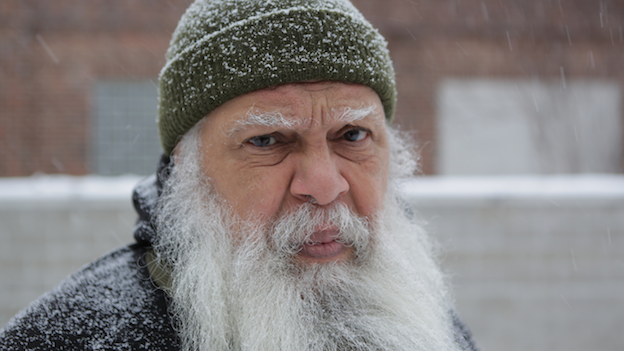|
|
Posted 2/1/2016 (link)
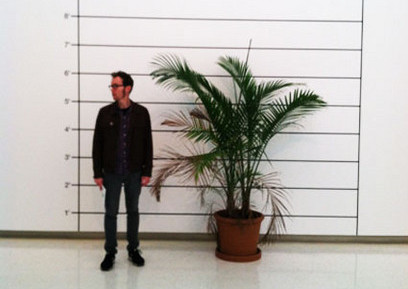 Last May Jacket2 published "Trouble Songs: A Musicological Poetics," Jeff T. Johnson's sprawling "investigation of the appearance of the word trouble in twentieth- and twenty-first-century music." Announcing the piece here on PennSound Daily, I praised the article as "a remarkably ambitious and capacious project that brings together the all-too-often disparate worlds of contemporary poetry and music." "Within," I continued, "we find Johnson deftly discussing John Ashbery, Amiri Baraka, Caroline Bergvall, and William Carlos Williams (among many others) with the same skill he dedicates to St. Vincent, Dock Boggs, Amy Winehouse, and Johnny Cash."
Now, with so many of us reeling from the deaths of David Bowie and C.D. Wright at the start of this year, Johnson has filed an addendum to "Trouble Songs." Entitled "Death's Head, Proud Flesh," this brief piece pays tributes to these two beloved artists, whose ends came unexpectedly and at high points in their careers. "Death shadows text and trouble emerges, even as it recedes; or the dead recede from trouble, leave it behind for the ones who can't do without it," he begins. "In the days after Wright's and Bowie's deaths, those who mourn the poet and rock star with the particular, half-guilty displeasure of those who know them only by their works, a number that now includes us all, they dance together into the cabinet. Those left at the station will get there soon enough."
You can read more here, and if you weren't already familiar with "Trouble Songs," this is an excellent time to read the entire piece.
Posted 2/3/2016 (link)
 We've recently added new audio and video from a pair of events in the Dia Art Foundation's Readings in Contemporary Poetry series.
The earlier of these events, recorded on December 16, 2010 features sets from Trace Peterson and Charles Bernstein. The latter, dating from March 10, 2011 showcases the work of Paolo Javier and John Ashbery. Both feature introductions by Vincent Katz and are presented as streaming video of the entire event as well as individual MP3s for each poet.
You'll find both of these readings here or by clicking the dates above, and don't miss out on some of the other readings you'll find on our Dia Art Foundation series page, including James Schuyler's first public reading in 1988 to more recent sets from John Yau, Jerome Rothenberg, Susan Howe, Anne Waldman, Ann Lauterbach, and Stacy Szymaszek.
Posted 2/5/2016 (link)
 Our latest author page, gathering recordings spanning seven years, is for poet Simone White.
The earliest of these are a pair of 2008 events — the first recorded March 11th as part of the Belladonna* reading series, the second a Segue Series reading at the Bowery Poetry Club on May 31st — offer listeners the opportunity to compare and contrast two sets with a considerable amount of overlap. Jumping forward to 2014, we have another Segue set, this one from the series current home, the Zinc Bar. All three of these readings are fully segmented with individual MP3 files for each title.
Thanks to Cloud House Poetry Archives we also have video footage of White delivering one of the 2014 Leslie Scalapino Memorial Lectures in Innovative Poetics at Small Press Traffic (alongside Divya Victor), as well as a link to the complete text of her talk via X Poetics. Finally, we have White's brief introduction to the launch reading for Poems for the Millenium, Vol. V: Barbaric Vast & Wild at the Poetry Project this past October 14th.
To start exploring the aforementioned recordings, click the title above.
Posted 2/8/2016 (link)
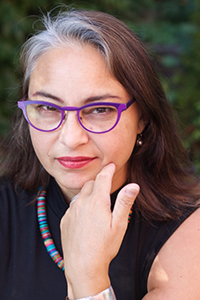 Tuesday night at 6:00 PM our own Kelly Writers House will host a reading by Canadian author Margaret Christakos.
Christakos has published nine collections of poetry, including Multitudes (Coach House, 2013), Welling (Scrivener, 2010, a Globe 100 book), Sooner (Coach House, 2005, a Lowther nominee) and Excessive Love Prostheses (Coach House, 2002, ReLit winner), as well as a novel, Charisma (Pedlar, 2000, a Trillium nominee). This May will see the release of her latest collection, Her Paraphernalia: On Motherlines, Blood/Sex/Loss & Selfies from BookThug.
In anticipation of her visit, we've put together a new PennSound author page for her, where you'll eventually be able to listen to her reading from this week. For the time being, you can find two brief sets of Christakos focusing on the work of others — a 2015 polyvocal performance of Rachel Zolf's Janey's Arcadia (alongside Zolf and Liz Howard), and her brief contribution to 2014's "A Tribute to Paul Dutton" — along with a half-hour reading of her own work from the Belladonna* reading series.
Posted 2/10/2016 (link)
 Here's a fascinating new addition to the PennSound archives: a lengthy interview with David Antin and Jerome Rothenberg conducted by Jake Marmer in San Diego on December 23, 2015. Al Filreis highlights the recording in a new Jacket2 commentary post, which contains Marmer's own lavish introductory essay, titled "Imagining a Poetry That We Might Find: Conversation with Jerome Rothenberg and David Antin." Here's how he begins:
"We were... desiring poetry, imagining a poetry that we might find — for which there was no strong evidence available," says David Antin, reflecting on his college days, as he and Jerome Rothenberg sit with me in David's dining room, in San Diego, around a tape recorder and a big French press. Desiring and imagining poetry — how different that is from merely writing, or reading, or even experimenting! Imagining and desiring: might that help shed some light on the incredible array of original, personal, deeply compelling poetic forms these titans of American poetry have invented, restored, and modified? As Antin points out in this interview: "I found a way to regard the poem itself as creating its own genre... We were looking for ways to overrun the tradition."
You can read the rest of his intro and find links to the complete recording here.
Posted 2/12/2016 (link)
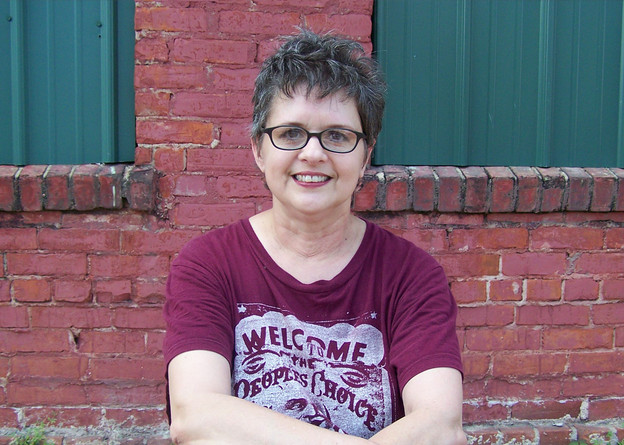 Steve McLaughlin is back with another installment of his Into the Field podcast series at Jacket2. This time around, his guest is Angela Genusa — "a major part of the conceptual writing scene" as he notes in his introduction — with whom he spoke via Skype in July 2014.
McLaughlin begins by discussing Genusa's use of spam as source material — "there are a lot of poets who use spam and I think you've outdone them all with Spam Bibliography (Troll Thread, 2013)" — and asks her to read from that book. Next, framed by Genusa's poetics statement for Elective Affinities, "I once wrote poems. Now I write poems-as-books. To paraphrase Ed Ruscha, I am looking for an inexplicable thing — a kind of a 'Huh?,'" he asks her about how she started as a writer and what sustains her poetic practice. From there she discusses her 2014 collaboration with programmer Benjamin Laird, Composition (Gauss PDF, 2014), "Contributor Bios for Mark as Spam Magazine, Issue Six" (published in McSweeney's Internet Tendency), Tender Buttons (Gauss PDF, 2013), Simone's Embassy (Editions Eclipse, 2015), onlinedating.teenadultdating/Adult-Dating (self-published, 2012), and Jane Doe (Gauss PDF, 2013), and she reads excerpts from the majority of these books. Among other topics they discuss are the place of humor in Genusa's work, her working correspondence with Gauss PDF publisher Gordon Faylor, her geographic distance from other poets, and her thoughts on print-on-demand culture.
Click here to listen. You can browse the previous twenty-two episodes in the series on Jacket2's Into the Field series page.
Posted 2/15/2016 (link)
Posted 2/17/2016 (link)
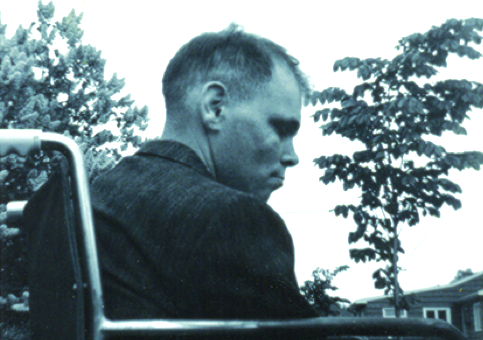 Today we launched the ninety-seventh episode in the PoemTalk Podcast series, which focuses on a trio of poems by Larry Eigner — "Again dawn," "a temporary language," and "unyielding rock" — dating from 1959, 1970, and 1971, respectively. Joining host Al Filreis for this program are Ron Silliman, Michael Kelleher, and Daniel Bergmann.
After providing the provenance for each poem and recording in his introduction on the PoemTalk blog, Filreis explores some of the issues related to interacting with Eigner's work in performance: "As an aid to those who will hear the podcast without having the text of the poems in front of them and thus might have trouble discerning all the words in Eigner's performances, we asked Ron Silliman to read the poems also. This is a decision made unlightly, and indeed we took time during the podcast to reflect on it. And, as Dan Bergmann suggests in his generous response, such considerations are themselves related to the fundamental issue Eigner raises in his verse: what it means to be 'articulate / beyond walls.' Kate Herzlin, Dan's aide who bespeaks what Dan spells on a spellboard, serves for him, he says, a role analogous momentarily to Ron's as he rereads Eigner. And as for whether the idea of a necessarily 'temporary language' supports or inhibits poetic immediacy, force, and accessibility — one of Eigner's ongoing themes — Dan observes: 'Immediacy and force are not my friends, but I don't think clarity is better than truth.'" You can read more, including scans of the Eigner poems under discussion, on Jacket2.
PoemTalk is a co-production of PennSound, the Kelly Writers House, Jacket2 and the Poetry Foundation. If you're interested in more information on the series or want to hear our archives of previous episodes, please visit the PoemTalk blog, and don't forget that you can subscribe to the series through the iTunes music store.
Posted 2/19/2016 (link)
 We're very happy to close out this busy week with a long-overdue author page for poet Joseph Massey. There you'll find audio and video of Massey's April 1, 2015 reading at our own Kelly Writers House with Thomas Devaney (and introductions by Frank Sherlock), along with a new recording session made exclusively for PennSound at our Wexler Studio on January 28, 2016.
Running a little over twenty minutes, this thirty-track set manages to provide a chronological overview of Massey's four books, starting from Areas of Fog (Shearsman, 2009), At the Point (Shearsman, 2011), To Keep Time (Omnidawn, 2014), and Illocality (Wave Books, 2015). Some specific poems included here: "On a False Spring," "Poem Including History," "The Process," "No Vehicles Beyond This Point," "Elk Ridge," "An Undisclosed Location in Northern California," "Another Rehearsal for Morning," "Surround," "Wrack Zone," "April Talisman," "The Frame," "Green Field," and "On Migration." Click here or the title above to start listening.
Posted 2/22/2016 (link)
 Here's a very exciting new addition to the site: a celebration of living legend John Ashbery held at Pioneer Works in Red Hook, Brooklyn on December 8, 2015. After opening comments by Ben Lerner, who coordinated the event, there are sets by Geoffery G. O'Brien, Mónica de la Torre, and John Yau, before Ashbery himself reads.
Each poet starts their brief set by discussing, in one way or another, Ashbery's influence upon their lives and work. O'Brien starts with his own poem, "d'Haussonville" before reading Ashbery's "Soonest Mended" from The Double Dream of Spring (1970). de la Torre reads from The Vermont Notebook (Ashbery's 1975 collaboration with Joe Brainard). Yau shares "A Snowball in Hell" from April Galleons (1987) and "Wet Casements" from Houseboat Days (1977).
Next Lerner retakes the stage to introduce the evening's guest of honor, beginning, "Some of my favorite words about John Ashbery were written by John Ashbery about Gertrude Stein." He reads several excerpts from the poet's review of Stein's Stanzas in Meditation and suggests that we might easily slip one of Ashbery's titles in place of Stein's to better understand his work. Next he quotes a character in his novel, Leaving the Atocha Station:
The best Ashbery poems describe what it's like to read an Ashbery poem; his poems refer to how their reference evanesces. And when you read about your reading in the time of your reading, mediacy is experienced immediately. It is as though the actual Ashbery poem were concealed from you, written on the other side of a mirrored surface, and you saw only the reflection of your reading. But by reflecting your reading, Ashbery's poems allow you to attend to your attention, to experience your experience, thereby enabling a strange kind of presence. But it is a presence that keeps the virtual possibilities of poetry intact because the true poem remains beyond you, inscribed on the far side of the mirror: "You have it but you don't have it. / You miss it, it misses you. / You miss each other."
He then goes on to praise Ashbery's later work and to describe his first encounter with his poetry before bringing the poet to the stage for a twenty minute set to conclude the evening.
"I don't really listen to my poetry that much," he offers "I enjoyed it." He starts with the last two poems in his most recent collection, Breezeway (2015): "Be Careful What You Wish For" and "A Sweet Disorder." Next, to honor his good friend James Tate on what would have been his birthday, he shares his final poem, found in his typewriter at the time of his death, which his widow, Dara Wier, had recently sent him. He segues back into his own work with "Depraved Indifference," which has an epigraph from Tate, then shares new poems including "The Mauve Notebook" (with an epigraph by O'Brien), "Days of 1948," "Die Meistersinger," "Who Will Do the Kissing?," "Passive-Aggressive," "Playing in Darkness," and "The Old Sofa."
Posted 2/25/2016 (link)
 I recently had the pleasure of segmenting this recording of Allen Ginsberg reading in Hudson, NY on April 22, 1994, which came to us through the good graces of Chris Funkhouser. Unlike his iconic three-night Knitting Factory engagement a little over a year from this recording — which focused exclusively on heavy-hitters like "Howl," "Kaddish," and "Wichita Vortex Sutra" — this marathon set, one hour and forty minutes in length, was a more typical Ginsberg reading of the era, offering a retrospective of his last twenty years of poetic output and highlighting key late poems.
As was his custom, he bookends the reading with performances of work by William Blake, starting with "The Tyger" and closing with an extending version of "Nurse's Song" from Songs of Innocence. Next he offers a few of his better-known 1970s poems — "Gospel Noble Truths," "'Don't Grow Old,'" "Father Death Blues," and "Plutonian Ode," with the last of these receiving a long introduction. From there he starts to make his way through his more recent collections, White Shroud: Poems 1980–1985 and Cosmopolitan Greetings: Poems 1986–1992, working chronologically and offering generous selections from each. We get all of the poems that were part of his repertoire in the 1990s — "Sphincter," "Do the Meditation Rock," "After Lalon," "Put Down Your Cigarette Rag (Don't Smoke)," "Hum Bom!," — but also lesser-known favorites like "After the Big Parade," "Autumn Leaves," "Research," and "Maturity," along with the "American Sentences" sequence. Ginsberg is in full-on elder statesman mode, offering lavish commentary on some of the poems, perhaps most notably (along with "Plutonian Ode" and "After Lalon") in his hybrid performance of interspersed sections of the "CIA Dope Calypso."
As someone who first discovered Ginsberg around this time and through some of these poems it's a great treat to be able to enjoy this long, high-quality recording of the poet just a few years before his death. You can start listening by clicking the title above or visiting our Allen Ginsberg author page.
Posted 2/29/2016 (link)
 One of our latest author pages is for poet Jack Mueller (shown at far right in the back row of the undated photo to the left, alongside Neeli Cherkovski, Allen Ginsberg, and Lawrence Ferlinghetti, among others).
There you'll find a twenty-seven minute recording of Mueller reading Budada at the Lithic Bookstore and Gallery in Fruita, Colorado, on November 14, 2015. One of several books by Mueller published by Lithic Press, the recently-published Budada was hailed by Jack Goodtimes in the Telluride Daily Planet's "the Watch" column as "a brilliant litany in alternating currents of unraveling paradox and spear-point wisdom, striking home." He continues, "Mueller combines the pure spirit eye of the Buddha with the crazy literary ferment of Dada. And comes up with the real jack of all aces and asses, 'Budada.'"
You can listen and judge for yourself by clicking the title above.
|
PennSound Daily archive
2023
2022
2021
2020
2019
2018
2017
2016
2015
2014
2013
2012
2011
2010
2009
2008
2007
|







